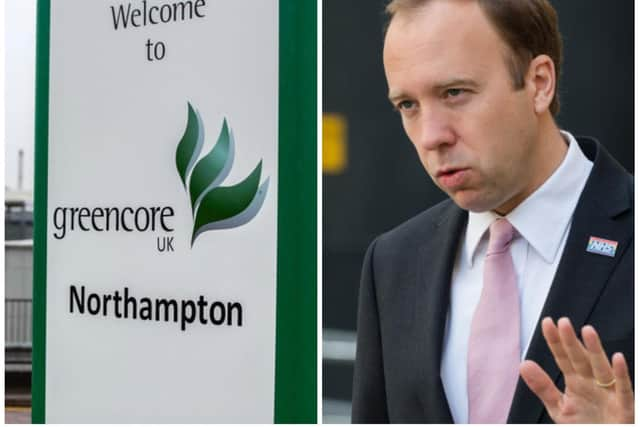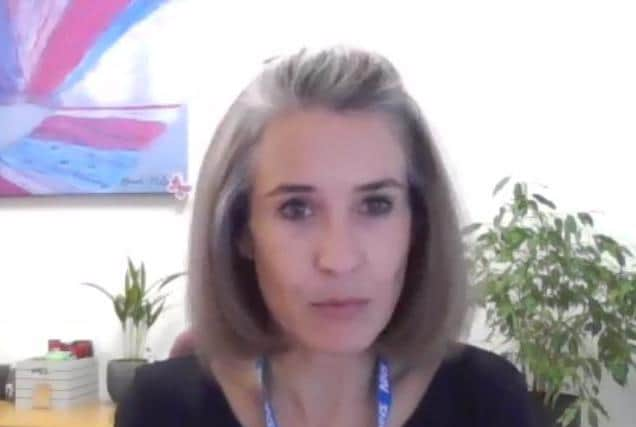Greencore: Inside story of health chief's battle with Government over Covid outbreak at Northampton factory
and live on Freeview channel 276
A sandwich-making factory in Northampton hit headlines for all the wrong reasons in July last year as the site of one of country's biggest workplace Covid-19 outbreaks.
Local Public Health officials found themselves at the centre of a coronavirus crisis as more than 300 workers tested positive for the virus at Greencore in Moulton Park.
Advertisement
Hide AdAdvertisement
Hide AdIt led to the town being listed as a virus hotspot, Government intervention, workers being sent hom and the factory shutting down.


Yet, in an interview with the Local Government Association, health director Lucy Wightman revealed Northamptonshire's teams appeared to be on top of the situation despite the challenge of dealing with workers speaking 35 different languages.
Mrs Wightman said: "We were alerted by Public Health England when they had two linked cases. We knew immediately it was a large employer and went in straightaway. Soon another four cases were confirmed, then another four.
“The employer was really co-operative – and that made it much easier. I know from other director of public health colleagues that is not always the case.
Advertisement
Hide AdAdvertisement
Hide Ad"They actually paid for private testing to done and paid all the workers who were isolating 80 per cent of their pay when all that was actually required for many was statutory sick pay.


“One of the biggest challenges was language — 35 different languages were spoken by staff so we had to translate the literature detailing what was expected in terms of isolation and testing.
“There were cases of transmission on to other members of the household who did not work at the factory too that we had to contend with. But it did not spread to the wider community.
“Greencore staff form a very close-knit community. Many had been recruited from abroad to work at the factory. They lived and socialised together – and that is where the transmission happened.
Advertisement
Hide AdAdvertisement
Hide Ad“The factory was very Covid-secure. It had taken all the steps expected. There were some extra things we recommended, but our main focus was on getting across the importance of social distancing outside of work. We now run a campaign ‘Don’t leave Covid-secure at the door’.”
But Mrs Wightman admitted one of the most challenging aspects of the local response came AFTER Northampton was declared an area for intervention off the back of the outbreak, which gave the Health Secretary Matt Hancock powers to close the factory and force every worker to self-isolate.
She added: “That hampered our ability to communicate with the workforce.
"We had 800 workers who had tested negative twice. They had been coming into work and we had been talking to them face-to-face about what needed to be done to reduce any on-going risk to them, their families and the wider community.
Advertisement
Hide AdAdvertisement
Hide Ad“But that stopped when the Government intervened and it created some mistrust in the workforce that we had to work hard to overcome, as well as having a big financial impact on the factory.”
Mrs Wightman added there may have been other times during the pandemic where measures in Northamptonshire have not gone far enough, quickly enough.
She added: “As directors of public health we are responsible for the health of our population. But we do not and have not been given the powers to fulfil that role.
"It has felt at times like we are impotent and unable to do our jobs.
Advertisement
Hide AdAdvertisement
Hide Ad“It is really hard for central government. They are dealing with something we have never had to deal with before so of course they are not going to get everything right.
"But central government really needed to trust local government and their partners more. There is so much expertise, not just among directors of public health, their teams and lower tier local authority environmental health officers, but regional Public Health England officials.
“We did not have the powers to do what we thought was necessary.
"We wanted to introduce the 10pm curfew on pubs and restaurants locally weeks earlier. The government eventually went for that but we would have chosen to act sooner."
Advertisement
Hide AdAdvertisement
Hide AdMrs Wightman also revealed a period when councils were denied detailed information about positive tests in their own area.
She said: “It was so frustrating.
"We knew PHE had the information, but they could not give it to us and that meant we could not target our response on areas where there was the most infections.
"It meant we had to rely on blanket communication methods — which we know do not work.
“Now we are doing leaflet drops in certain neighbourhoods and targeted social media campaigns at certain demographics. It is a much more effective way of encouraging people to adhere to the rules.”